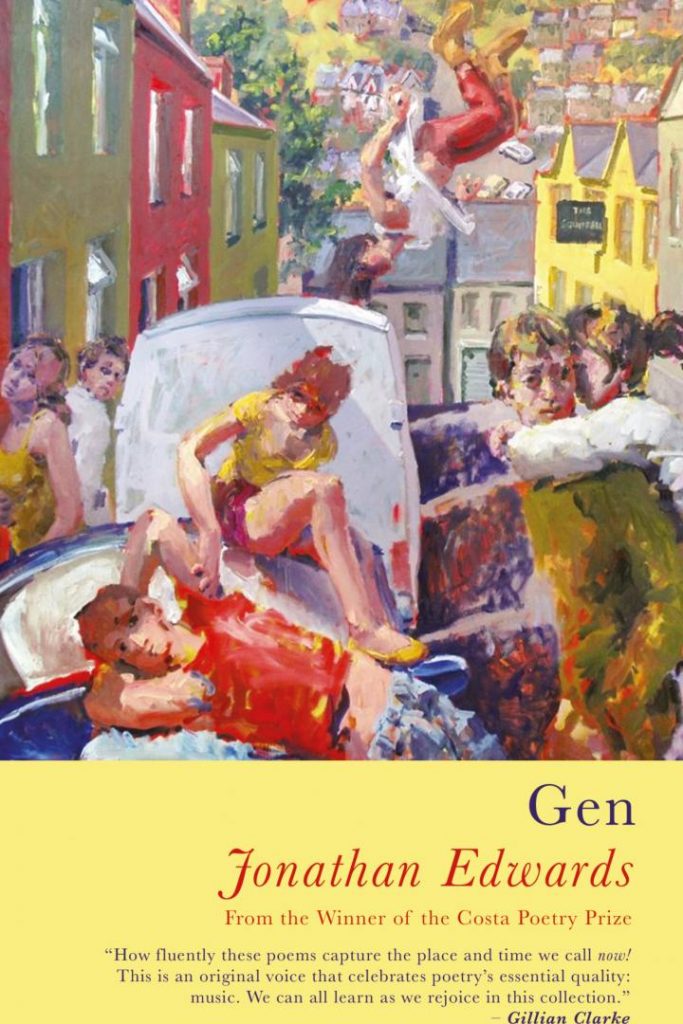Gen
Jonathan Edwards
(Seren Books, 2018); pbk £9.99
Jonathan Edwards’ first full poetry collection, My Family and Other Superheroes, was met with critical acclaim. It won the Costa Poetry Award and was shortlisted for the Fenton Aldeburgh First Collection Prize. Writing a follow-up to this debut might have seemed a daunting task. Edwards, however, has nothing to worry about.
Gen is full of the same warmth, good humour and originality that characterises his debut collection. The poetry collection is a testament to Edwards’ fascination with the quotidian. Rather than focusing exclusively on its author, the collection includes poems on the poet’s mother and father, famous strangers, people from the past, animals, and even inanimate objects. Edwards focuses not only on what he might know – for example that his mother cut her arm in 1955 – but also on what he can only imagine. After all, we can only imagine what it would be like to be a tree in a retail park. Gen is not limiting itself to Edwards’ own life experiences.
The poems in Gen are characterised by the poet’s imagination and mastery of imagery. Rather than telling us how his characters feel, Edwards chooses to present us with little moments from their lives. Reading his poetry is, in many ways, a visual experience as we get to see the scenes unfold before us.
These scenes are often nothing more than a quick glimpse, as the poems in Gen share a certain swiftness of character. Reading the poems out loud, words tumble over one another; an effect created by carefully chosen periods, length of sentences, and line breaks. An example can be found in the very first stanza of the very first poem, ‘Spring Song Sing Song’, which musical and childlike title only adds to the provisional feel of the poem.
Begin again. The birds are up to what
they’re up to always, aren’t they, listen, those
persistent little fuckers, and the sun
is shining down on courting couples, like
a high-watt bulb, say, in a top-floor flat,
might shine its little heart out on a room
of high-grade hashish plants, and your breath loyally
or out of habit, say, goes out, goes in.
So what now is is as good a time as any
To get up off your arse boy and begin.
At one point, Edwards goes over sixty words before using a period, and the effect is both remarkable and full of impatience. The poem’s pacing – a rush of words that spill out in their hurry to get out and into the world – gives the impression of a forbidden look into someone else’s life. Short and simple moments that represent the complexity of the human experience. These moments can include anything from watching television ‘Olympic 100m Final, Seoul, 1988’ to a kiss ‘Couple Kissing Against the Wall of a Pub’ to the feeling of being eleven and on the way to the sweet shop ‘My Father Buying Sweets, 1956’.
[…] he pauses helpfully
beneath a streetlight, so we can watch him
lift one gleaming thing from the bag, unwrap it,
raise it to his lips –
This poem tells us about a simple and unremarkable moment, which is imbued with both warmth and a tinge of sadness for the things yet to come.
[…] the shop will go to bedsits, the bedsits
to ruin, my father’s mouth will bloom
with fillings […]
These single everyday moments are the focal point in Gen, and it can be argued that they are also the focal point of life. Life is, after all, nothing but a series of moments – a kiss, a bike ride, a proposal, and Gen is, at its core, a heart-warming and tongue-twisting attempt to capture these moments.
Maria Sjostrand


Leave a Reply